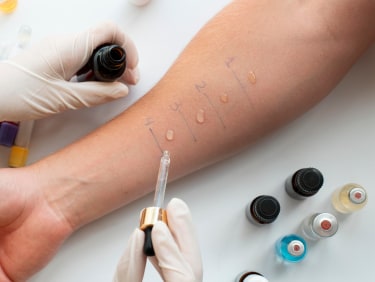Allergy Testing and Immunotherapy - Mullica Hill Medical, NJ
Allergy testing is an important tool in identifying substances or activities which might trigger allergic reaction in your body. It can be done by an allergist/immunologist, or in some cases, by a primary care physician.
Allergy immunotherapy is the preventive treatment for allergic reactions to substances such as bee venom, grass pollen, and house dust mites. This process involves giving gradual doses of the allergen to the patients in increasing amounts.
Book an appointment now or call (856) 478-2111 to discuss your care.

What is an allergy, and why do I have it now?
Your immune system helps protect your body from infection and disease. But it can overreact to a harmless substance, releasing chemicals known as histamines, leukotrienes, and prostaglandins. It is these chemicals that trigger the allergic symptoms you may be experiencing.
An allergy can develop at any time in a person’s life but often develop when we’re young. Allergies can originate from a combination of factors, particularly genetics and environment. For example, a child with one parent who has allergies has a genetic predisposition that increases their risk of developing allergies by 50%. The risk increases to 70% if both parents are allergy sufferers.
Some common allergies are:
- Allergic Rhinitis
- Cockroach Allergy
- Drug Allergies
- Eye Allergy
- Insect Sting Allergy
- Latex Allergy
- Mold Allergy
- Sinus Infection
Our Approach

Allergy Skin Testing
This is the most common type of allergy test. A small amount of the suspected allergen is placed on the skin for this test. If you are allergic to the substance, you will develop a raised, red bump called a wheal. A secondary reaction may also occur, resulting in a larger area of swelling and redness.
During this test, your skin will be exposed to substances suspected of causing the allergy to observe the allergic reaction signs. This test and your medical history will help confirm whether a particular substance is causing your allergy symptoms.

Allergy Blood Testing
This is another option that is used to diagnose allergies. A blood sample is used to analyze the presence of antibodies to specific allergens.

Allergy Immunotherapy
Also known as allergy shots, this treatment can help reduce your allergy symptoms by increasing your tolerance to allergens. Allergy shots are usually given over 3-5 years. After that, annual booster shots are usually needed to maintain your tolerance to allergens.